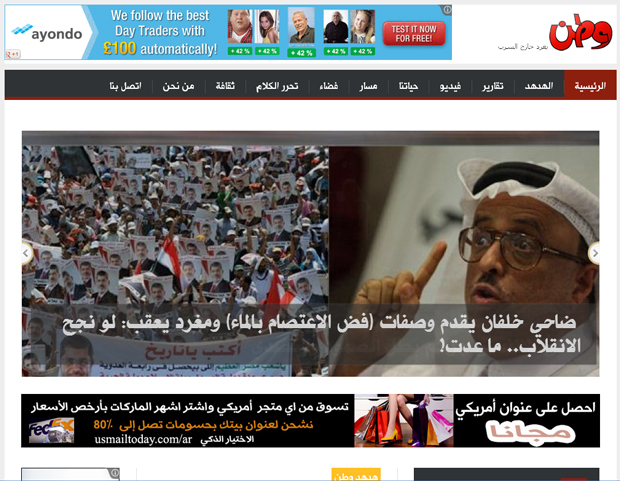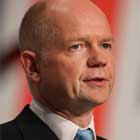Index relies entirely on the support of donors and readers to do its work.
Help us keep amplifying censored voices today.

Authorities in the United Arab Emirates (UAE) are making transnational attempts to shut down a site belonging to the United States’ largest Arab-American newspaper, al-Watan.
The UAE’s Telecom Regularity Authority has sent a letter to watan.com’s German hosting company demanding the site be shut down, alleging that it is owned by the ‘Global Muslim Brotherhood Union’. The site’s founder Nezam Mahdawi denies this, claiming that they are being targeted due to reporting of human rights violations in the UAE.
Al-Watan is a popular news site in the Arab world, receiving over 120,000 pageviews per day, and is known for its liberal secular stance when reporting on political developments in the Middle East from its base in the United States. The site, which is banned in the UAE and other Gulf states, reports freely on sensitive political issues that domestic media are unable to broach due to censorship laws.
The UAE is ranked 114th for press freedom by Reporters Without Borders. Political parties are banned in the UAE and when a forum discussing political reform became popular in 2011 it was swiftly shut down along with the site’s owner put in prison for insulting the president. Social media sites have seen much criticism of the authorities, which led to a new Cybercrimes Decree being passed in September 2012 outlawing the use of information technology to criticize the government.
The increased chill on free speech stems from a March 2011 petition calling for democratic reform in the shape of a wholly elected parliament with full legislative powers. Those supporting reform are smeared as Muslim Brotherhood conspirators in a crude attempt by authorities to turn the public against anyone who questions their autocratic powers.
As al-Watan’s founder Nezam Mahdawi says: “if you criticize human rights violations in the UAE the authorities label you Muslim Brotherhood”. Mahdawi has also been personally targeted, with Emirati authorities hacking his personal email account and threatening to publish photos of his daughter should he refuse to close his news site. These attempts to shut down watan.com contradict the image of a country whose rulers try very hard to project as liberal and progressive.
It is worth noting that authorities have not blocked any English language news sites that criticize the government yet have aggressively pursued the Arabic al-Watan. Dr. Matt J Duffy, an expert on media law in the Middle East, believes this “allows the government to feign the appearance of plurality of opinion to the English-speaking audience”. The reality of the situation is that the UAE is neither liberal nor progressive when it comes to dealing with those who wish to criticize human rights violations or call for democratic reforms.
The attacks on al-Watan are a clear attempt to take the UAE’s free speech restrictions beyond its own borders. Thankfully the site is still running although the German hosting company, Hetzner Online AG, has yet to respond to al-Watan’s letter asking for the site not to be shut down.
Al-Watan provides a crucial platform for news to be reported in Arabic to a Middle East audience bereft of newspapers. It is easy to see why the UAE, with one of the highest per capita rates of political prisoners in the region, would want to shutdown a website that exposes their abuses.
The UAE enjoys an international image of being seen as liberal and progressive, belying the reality of a country becoming a police state. This is why it is so important that the hosting company of watan.com resist pressure from authorities to shut it down and why international media should highlight the plight of the United States’ largest Arab-American newspaper.
Prominent UAE blogger Ahmed Mansoor says that he was beaten by an unidentified man on 17 September. Mansoor was attacked as he was approaching his car at Ajman University of Science and Technology, where he studies law. The attacker knocked Mansoor to the ground and began punching him, but ran away once people entered the parking lot. Once Mansoor was free, he tried to follow him, but was quickly blocked by another unidentified man, who drove off with the attacker. Mansoor says this is the second time that he has been beaten. The United Arab Emirates has been cracking down on political activists and groups, most recently arresting 13 activists tied to Islamist group al-Islah on 16 July. Mansoor was imprisoned and released last year for posting messages critical of political figures in the now-banned UAE Hewar forum. The blogger has been active in speaking out against the crackdown, which has also resulted in the arrest of prominent human rights activist and lawyer, Mohammed al-Roken.
 Index joins a group of international rights groups in calling on UK Foreign Minister William Hague and US Secretary of State Hillary Clinton to push for the prisoners’ release
Index joins a group of international rights groups in calling on UK Foreign Minister William Hague and US Secretary of State Hillary Clinton to push for the prisoners’ release
Since March, Emirati authorities have arrested over 50 activists and human rights defenders in a widespread crackdown on dissent.
Dear Foreign Secretary,
We are writing to draw your attention to some disturbing human rights developments in the United Arab Emirates, where the authorities have launched a campaign of arrest, arbitrary detention and deportation to repress and intimidate peaceful political activists.
Since late March, the authorities there have arrested at least 50 Emirati civil society activists and human rights defenders. In recent weeks there has been a marked escalation in the crackdown on those advocating political reform in the UAE, with two prominent human rights lawyers, Mohammed al-Roken and Mohammed al-Mansoori, amongst those detained in a spate of arrests and detentions.
Although none of those arrested have been formally charged with any offence, there are strong indications that the detentions are being linked to issues of national security. A July 15 statement by the UAE’s official news agency said Attorney General Salem Sa’eed Kubaish had ordered the arrest and investigation of “a group of people for establishing and managing an organisation with the aim of committing crimes that harm state security”. The statement also accused this group of having connections with “foreign organisations and outside agendas” and promised to “expose the dimensions of the conspiracy”.
Al-Roken is a prominent human rights lawyer in the Emirates, and has provided legal assistance to al-Islah members detained without charge since March, including a group that authorities stripped of their citizenship. In 2011 he served as co-defence counsel for two of the five activists known as the “UAE 5 ,” who were imprisoned for seven months and tried in 2011 after allegedly posting statements on an internet forum critical of UAE government policy and leaders.
Al-Mansoori is the deputy chairman of al-Islah and a former president of the Jurists’ Association. The UAE authorities dismissed him from his position as a legal advisor to the government of Ras Al Khaimah in January 2010 after he gave a television interview in which he criticised restrictions on freedom of speech in the country. They have barred him from travelling since October 2007 and have refused to renew his passport since March 2008.
On 24 July the Abu Dhabi Court of First Instance sentenced a former judge and University of Sharjah law professor, Dr Ahmed Yousef al-Zaabi, to 12 months’ imprisonment for fraud and assuming another person’s identity. Al-Zaabi’s conviction was based on the fact that his passport still registered his profession as “judge” after his public support for political reform in the UAE had resulted in him being forced into retirement. The authorities’ targeting of lawyers has discouraged members of the Emirati legal profession from offering their services, thereby denying the detained men legal assistance.
On 16 June, the UAE deported Ahmed Abd al-Khaleq, an advocate for the rights of stateless residents known as Bidun. He had been held in detention without charge or explanation since 22 May and was informed that he would be indefinitely detained if he did not agree to leave the UAE. Abd al-Khaleq is one of the UAE 5. UAE authorities charged the UAE 5 in early June 2011 under articles 176 and 8 of the UAE Penal Code, which criminalise “public insults” of the country’s top officials. They were detained throughout a seven-month pre-trial and trial process. The Federal Supreme Court convicted them on 27 November and sentenced them to between two and three years in prison. Shortly afterward, Shaikh Khalifa bin Zayed Al Nahyan, the UAE president, commuted the sentences and they were released. However, the events of recent days have again revealed the lengths to which the UAE authorities are prepared to go to curb dissent.
In January of this year, you wrote that freedom was “still flowering” in the Arab Spring and described how protection against arbitrary punishment and freedom of expression were taking hold in the region. This is manifestly not the case in the UAE, where freedom of speech is being aggressively repressed by intimidation, arbitrary detention and deportation.
We urge you and the UK government to raise these issues at the highest levels with the UAE authorities, and to criticise publicly the repression of free speech and free association, the harassment of members of the legal profession, and to call for the immediate release of the detained activists.
Yours sincerely,
Rachid Mesli, Director, Legal Department, Alkarama Foundation
Mary Lawlor, Executive Director, Front Line
Khalid Ibrahim, Acting Director, Gulf Centre for Human Rights
David Mepham, Advocacy Director, Human Rights Watch
Kirsty Hughes, Chief Executive, Index on Censorship
The United Arab Emirates deported an online activist to Thailand yesterday, it has been reported. Ahmed Abdul Khaleq was stripped of his rights to live in the country as a result of his campaigning. His website included appeals for a greater public role in the UAE’s political affairs. Political parties are banned in the Gulf nation. Khaleq was among five other activists who were convicted last year of anti-state crimes for insulting the UAE’s leaders. They were later pardoned, but the charges against them were not officially dropped.